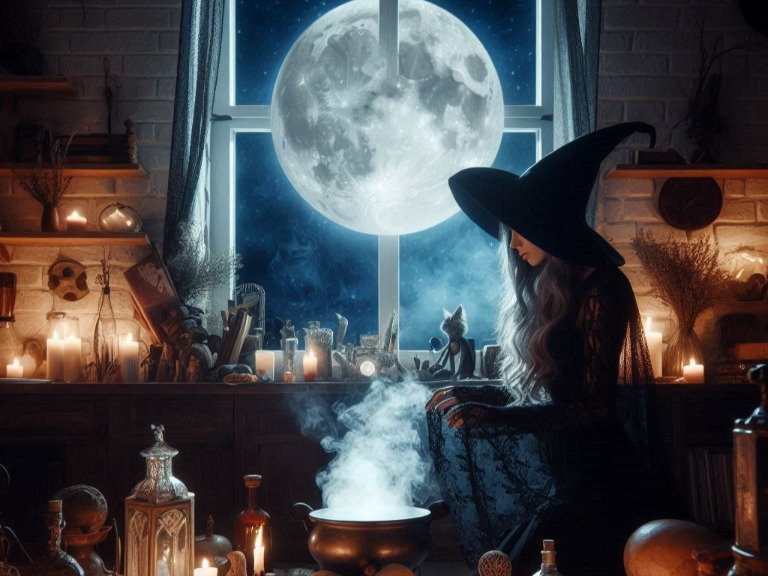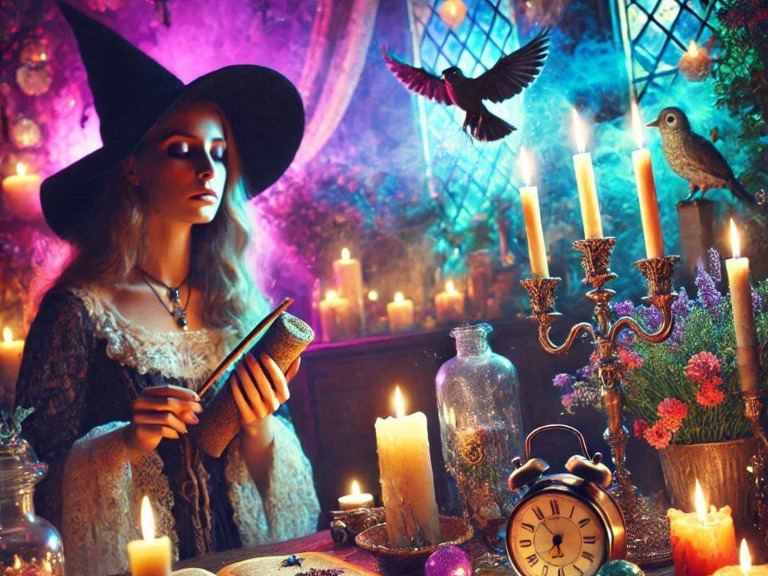
Embarking on the journey of spellcasting is like stepping into a realm where intention meets energy and the mundane transforms into the magical. However, as exciting as this practice is, it’s also a bit like learning to dance—beautiful when done well, but sometimes, we step on our own toes. Every witch has been there, fumbling through their first rituals, or even their hundredth, realizing later that something felt “off.” The truth is, spellcasting is as much about avoiding common pitfalls as it is about mastering techniques.
Mistakes don’t make you a bad witch; they make you human. Every misstep is a lesson, and in a way, that’s where the magic truly happens. Perhaps you’ve forgotten to charge a crystal, overlooked the importance of grounding, or tried to rush a spell that needed patience. Whatever the case, recognizing and addressing these errors is part of the learning process that strengthens your craft over time.
This guide isn’t here to point fingers but to hold a lantern to those shadowy corners of spellcasting that trip us up. By understanding common mistakes and how to avoid them, you can hone your craft and cultivate a more mindful, magical practice.
Common Mistakes in Spellcasting

Spellcasting, at its core, is about directing energy toward a desired outcome, but mistakes often sneak in when we least expect them. One of the most common errors is rushing through the process. Magic thrives on focus and intention, and when you’re in a hurry, it’s easy to skip vital steps. Whether it’s forgetting to cleanse your tools, muddling your correspondences, or glossing over the preparation phase, these small oversights can weaken the spell’s effectiveness.
Another frequent issue is doubting your abilities. Spellcasting is deeply personal, and second-guessing yourself can sabotage the energy you’re trying to harness. Confidence is key; without it, your intentions might falter. It’s important to trust in your own power and remember that magic flows through you, not because of external validation but because of your belief and focus.
Lastly, treating spells as a “set it and forget it” process is a mistake many new witches make. Manifestation often requires action on your part, not just a sprinkling of herbs or the lighting of a candle. The physical and mundane actions you take to align with your spell’s intent are just as important as the magical elements themselves.
10 Spellcasting Mistakes Every Witch Should Avoid
1. Lack of Clear Intentions

Intentions are the heart of spellcasting. Without them, your magic becomes like a ship without a rudder, aimlessly drifting without direction. One of the most common mistakes is casting a spell with vague or unclear intentions. For example, asking for “happiness” without specifying what that means to you can lead to unexpected results or no results at all.
It’s essential to take time to define your intention clearly before starting a spell. Ask yourself: What do I truly want? Why do I want it? What will it look and feel like when I achieve it? Writing your intention down or speaking it aloud can help you clarify and focus your energy. Remember, the universe responds best to specificity, so be as detailed as possible.
Another pitfall is having conflicting intentions. If your desires are muddled or contradictory, the energy you’re directing can become tangled, reducing your spell’s effectiveness. For instance, casting a love spell while harboring fear or doubt about relationships can send mixed signals. Aligning your thoughts, emotions, and intentions ensures your magic is cohesive and powerful.
2. Overcomplicating Spells

Sometimes, in the excitement of creating magic, we can overcomplicate things. Layering too many elements into a single spell can dilute your focus and leave you feeling overwhelmed. While it’s tempting to use every herb, crystal, or symbol in your arsenal, simplicity often holds the most power.
Overcomplication can also stem from the misconception that a more elaborate spell equals a more effective one. In reality, magic works best when it’s direct and intentional. For example, a single candle and a clear intention can be just as effective, if not more so, than an intricate ritual with multiple components. The key is clarity, not complexity.
Streamlining your practice doesn’t mean sacrificing depth—it means focusing on what truly matters. Ask yourself: What is the core of my intention? What tools or actions will best support it? By paring down to the essentials, you can create spells that are not only easier to perform but also more aligned with your energy and intent.
3. Overlooking Correspondences

Correspondences are the magical associations that tie your tools, ingredients, and timing to your spell’s purpose. Overlooking these can dilute your spell’s potency. For instance, using an herb or crystal without considering its energy can create a mismatch, like trying to bake a cake with the wrong ingredients. While it’s tempting to grab what’s on hand, taking the time to align your materials with your intentions amplifies your magic.
Another aspect of correspondences that often gets overlooked is color magic. The hues of your candles, altar cloths, or even your clothing can subtly but powerfully influence the energy of your spell. Ignoring these details can result in an energetic clash, making your spell less effective. For example, using red for a calming spell might stir up passion or aggression instead.
Finally, correspondences aren’t just about items—they also involve timing and celestial influences. A spell for abundance cast during a waning moon might not yield the results you’re looking for because the energy isn’t aligned with your intent. Keeping a correspondence journal can help you track what works and build a stronger connection to the tools and symbols of your craft.
4. Ignoring the Moon Phases

The moon has long been a guide for witches, her phases offering a natural rhythm for different types of magic. Ignoring the moon’s cycle is like trying to row a boat upstream—it can be done, but it’s much harder. Each phase has its own energy: the new moon is perfect for fresh starts, the full moon for abundance and clarity, and the waning moon for release. Skipping this step can make your spells feel less aligned and harder to manifest.
It’s also worth noting that working against the moon’s energy can sometimes lead to unintended results. For instance, casting a growth or attraction spell during the waning moon, which is a time for banishing, might backfire or have lackluster outcomes. Learning to flow with the lunar cycle enhances your connection to nature and boosts the effectiveness of your spells.
Even witches with the best intentions sometimes forget the moon’s influence, but incorporating it doesn’t have to be overwhelming. Simple actions like checking a moon phase calendar or journaling about lunar energy can help you stay aligned. The moon is a powerful ally—working with her instead of against her ensures your magic flows effortlessly.
5. Neglecting Grounding and Centering

Grounding and centering are foundational practices that anchor your energy and focus, yet they’re often overlooked in the excitement of spellcasting. Without grounding, your energy can become scattered, leaving you feeling drained or even anxious after a spell. Grounding connects you to the earth, helping to stabilize your energy and keep you present during your magical work.
Centering, on the other hand, ensures that your inner energy is balanced and focused. When you skip this step, it’s like trying to shoot an arrow without aiming—your intent might not hit its target. Taking a few moments to breathe deeply, visualize your energy flowing to and from your core, and settle your mind can make all the difference in the potency of your spell.
Neglecting grounding and centering doesn’t just impact the effectiveness of your magic; it can also affect your well-being. After casting, you might feel overwhelmed or disconnected. Simple practices like standing barefoot on the earth, holding a grounding crystal like hematite, or visualizing roots growing from your feet into the ground can help you regain stability.
6. Improper Preparation

Preparation sets the stage for successful spellcasting, but rushing into a spell without proper groundwork is a mistake many witches make. Skipping steps like cleansing your space, tools, or even your own energy can lead to chaotic or ineffective results. Think of preparation as clearing the runway for your magic to take flight.
Another common oversight is not gathering all the materials you need beforehand. Realizing mid-spell that you’re missing a crucial herb or candle can disrupt your focus and energy flow. Taking time to plan and organize your ritual ensures that you can perform your spell smoothly and without distractions.
Preparation isn’t just about physical tools; it’s also about mental readiness. If you’re feeling rushed, stressed, or distracted, your energy may not be aligned with your intent. Setting aside dedicated time, meditating beforehand, or even creating a small pre-spell ritual can help you enter the right headspace for magical work.
7. Overlooking the Importance of Timing

Timing is a subtle yet powerful aspect of spellcasting that’s often underestimated. The energy of the day, hour, or even season can greatly influence the outcome of your spell. Casting without considering these factors is like planting seeds at the wrong time of year—they might grow, but not as robustly as they could have.
For example, each day of the week is associated with specific planetary energies: Monday for emotions and intuition (ruled by the Moon), Thursday for abundance and success (ruled by Jupiter), and so on. Aligning your spell with these energies can enhance its effectiveness. Similarly, the time of day—morning for new beginnings, evening for reflection—can add another layer of power.
Ignoring timing can lead to spells feeling “off” or taking longer to manifest. While it’s not always possible to perfectly align with ideal timing, being mindful of it and working with it when you can helps you flow with natural energies rather than against them.
8. Underestimating the Power of Belief

Belief is the fuel that powers your spell, and underestimating its importance is a mistake that can undermine even the most carefully crafted rituals. Doubt or skepticism weakens your energy, creating resistance that hinders manifestation. Magic isn’t just about the tools and words; it’s about the unwavering conviction that your spell will work.
It’s not unusual for beginners to feel unsure, but building confidence in your abilities is crucial. Start with small, achievable spells to see your magic in action and reinforce your belief. Over time, as you witness results, your faith in your own power will grow stronger.
Remember, belief doesn’t mean blind faith. It’s about cultivating a mindset where you trust in the process and the universe’s ability to align with your intention. If you find yourself struggling with belief, affirmations, visualizations, or meditative practices can help strengthen your connection to your inner magic.
9. Ignoring Intuition

Your intuition is one of the most powerful tools in your magical toolkit, yet many witches overlook or second-guess it. Ignoring your gut feelings can lead to spells that feel off or fail to align with your true desires. Intuition acts as a compass, guiding you toward the most effective choices for your unique practice.
One common mistake is relying too heavily on books, guides, or others’ instructions without adapting them to fit your own energy. While learning from others is valuable, it’s important to trust your instincts when something feels out of sync. If a particular herb or incantation doesn’t resonate with you, substitute it with something that does. Magic thrives on personal connection and authenticity.
Learning to listen to your intuition takes practice, but it starts with quieting the noise around you. Meditating, journaling, or spending time in nature can help you tune in to your inner voice. Over time, as you begin to trust your instincts more, you’ll notice your spells feeling more aligned and powerful.
10. Misusing Words and Symbols

Words and symbols carry immense power in spellcasting, but misusing them can unintentionally shift the energy of your magic. For instance, choosing an incantation or symbol without fully understanding its meaning might introduce conflicting energies into your spell. It’s essential to research and connect with the words and symbols you use to ensure they align with your intention.
Another common mistake is being too vague or ambiguous in your wording. Spells require precision; otherwise, the universe may interpret your request in unexpected ways. Instead of saying, “I want success,” try specifying what success means to you, such as “I will achieve my goal of starting a successful business.” The more detailed and intentional your words, the clearer your spell’s directive becomes.
Finally, don’t underestimate the importance of speaking or writing your spells with conviction. Whispering an incantation half-heartedly or scribbling a sigil without focus can diminish its power. Whether you’re chanting aloud or writing your intentions in your Book of Shadows, do so with clarity and confidence to amplify the energy you’re directing into the universe.
Final Thoughts
Mistakes in spellcasting aren’t failures—they’re opportunities for growth and refinement. Every misstep teaches you something valuable about your craft, helping you develop a deeper connection to your magic and the energy around you. By understanding these common pitfalls and taking steps to avoid them, you can transform your practice into a more mindful and effective journey.
Remember, magic is as much about the journey as the destination. Embrace the process, celebrate your progress, and don’t be afraid to experiment and adapt. Your practice is uniquely yours, and every spell, whether it succeeds or falters, is a step toward mastering your craft.
So go ahead, light that candle, speak your intentions, and trust in the power within you. Mistakes may happen, but with awareness and care, you’ll continue to grow into the witch you’re meant to be—wise, confident, and deeply connected to your magic.




